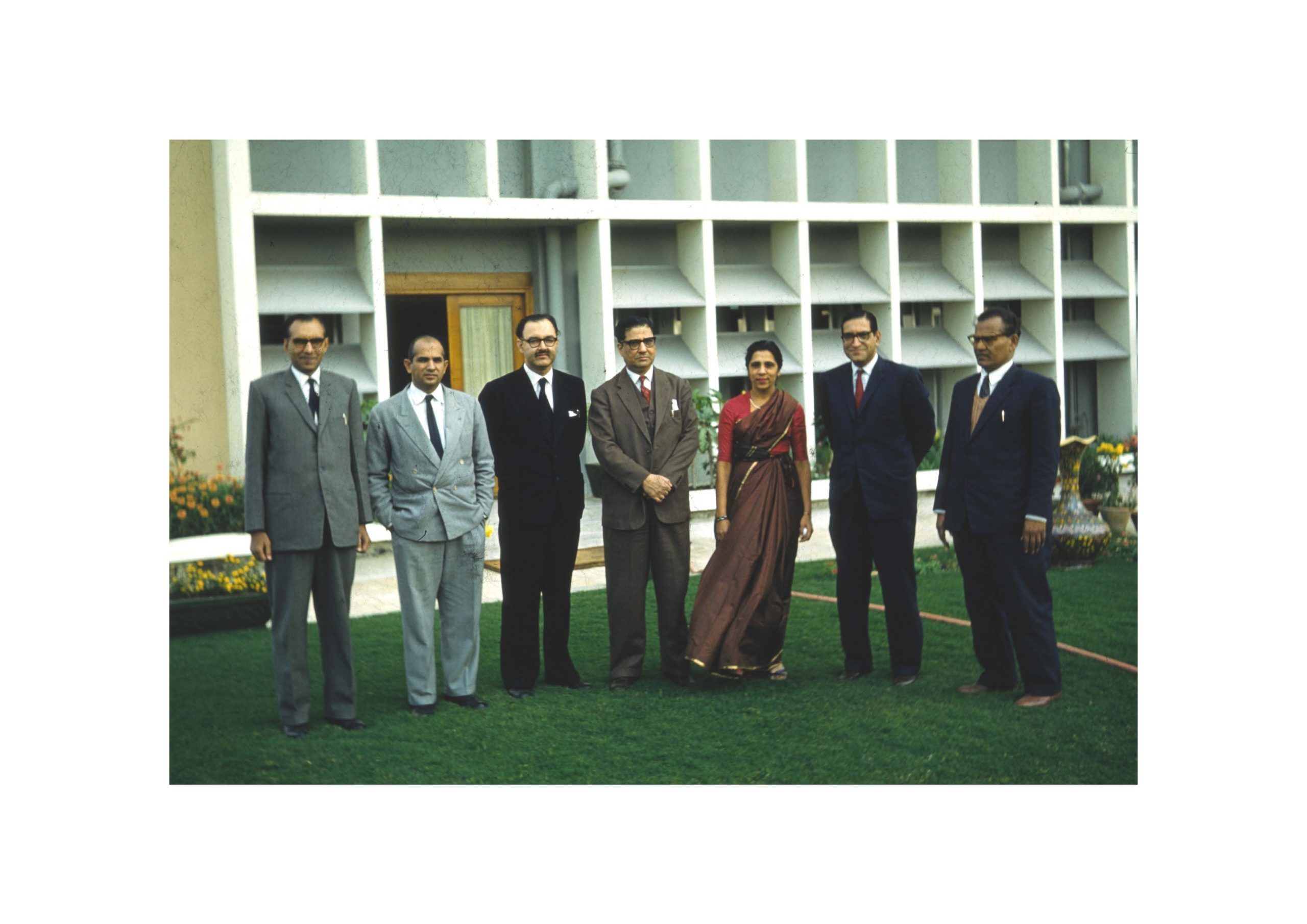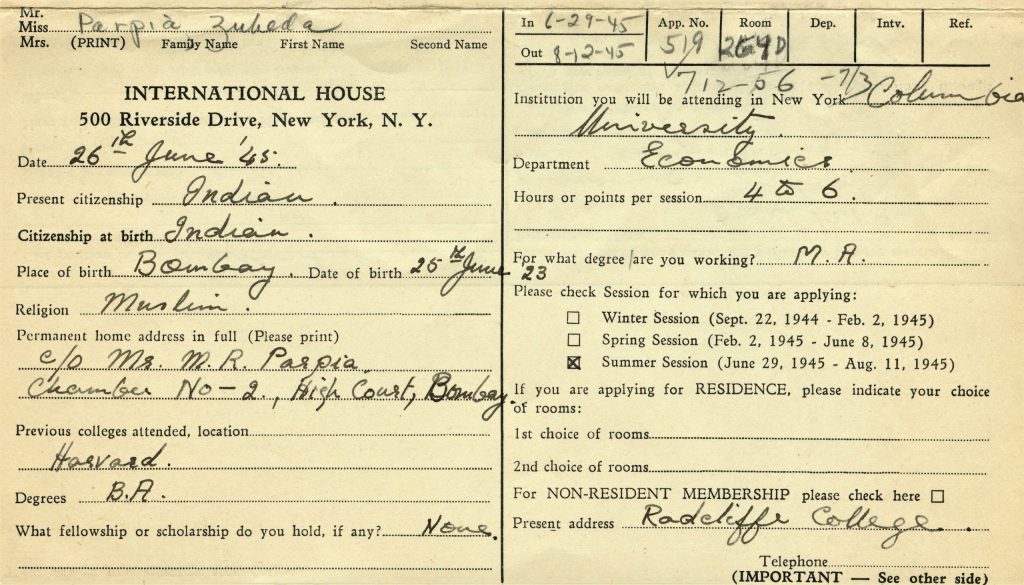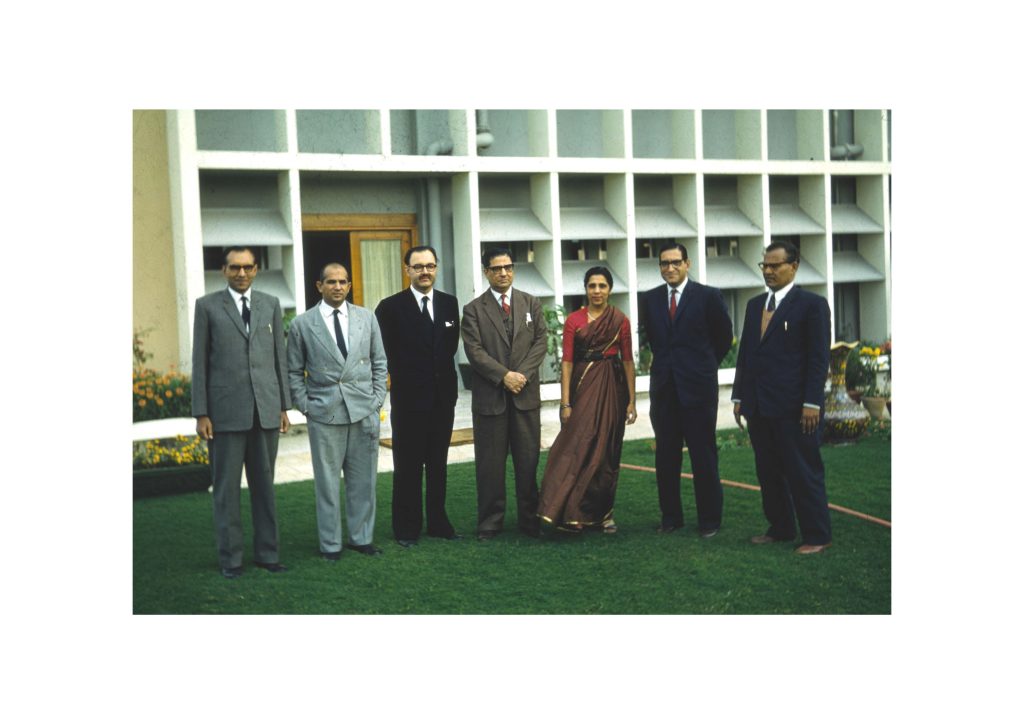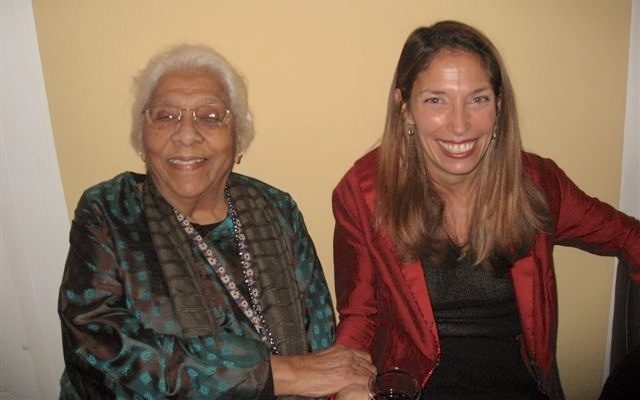
Alumna Spotlight: Zubeida (Parpia) Ahmad ’45, A Champion of Women’s Rights
A chance introduction in 2008 led to a friendship and an unlikely “small world” International House connection with a strong and accomplished woman who became one of the earliest advocates of micro-financing and women’s rights in developing countries in the postwar period.
Several years after Marianne Murphy Francke and her husband Nils Francke ’85 moved to Geneva, Switzerland, Marianne started taking French lessons.
“One of my classmates was moving back to the US and asked if any of us would like to ‘take over’ her weekly lunches with a very interesting older woman who offered help in French in exchange for interesting conversation,” Marianne recalls. In 2008, the two became friendly, lunching and going for walks in a nearby park.
One day, when Marianne mentioned she was hosting a group of International House friends, the older woman lit up.
“I stayed at I-House!” she exclaimed.
Zubeida “Zubi” Parpia arrived at I-House in the summer of 1945. The youngest child of an established Shia-Ismaili family in Bombay (now Mumbai), she had received a scholarship to study English literature at Radcliffe College. En route to Boston in 1943, while WWII was still raging, Zubi was inspired by missionaries she met aboard a troop ship to study something that would be helpful to people in her home country, so she switched her focus from English literature to economics. As Radcliffe did not offer a degree in economics, she instead studied at Harvard under the renowned economist John D. Black.

Zubeida “Zubi” Parpia’s Application for Residency / I-House Archives
Zubi had come to International House to reunite with her fiancé Manzoor Ahmad. The two had met in Bombay shortly before she left India and vowed to find a way to be together. Himself being a talented scholar, Manzoor was granted a scholarship to study at Northwestern University in Chicago.
Zubi described to Marianne how the couple enjoyed the freedom to hold hands in public for the first time at I-House, and explored NY City together, going to the theatre, jazz and concerts.
In the following years, I-House became a touchstone in the couple’s lives as Zubi pursued her PhD at Harvard and Manzoor his MBA at Northwestern. They married in Chicago in 1949, and stayed at I-House on frequent visits to New York.
With the partition in 1947 of colonial-era India into Pakistan and India, they became citizens of Pakistan, and in 1950 relocated to Karachi where they both assumed significant positions in the newly-formed country. Zubi became the Chief of the Department of Agricultural Credit at the State Bank of Pakistan (the country’s central bank), where, she recalled, she had to be accompanied to the restroom by a chaperone since there were no facilities for women at the bank.

Zubi Ahmad at the State Bank of Pakistan (Photo courtesy of the Ahmad Family)
In those early days, Pakistan proved difficult in other ways for a career woman, and the couple began to search for opportunities abroad. In 1958, shortly after the coup d’etat that saw General Ayub Khan introduce martial law, the couple and their three young children moved to Geneva, Switzerland, where Zubi began a career with the International Labor Organization (ILO), an institution established in 1919 whose mandate is to advance social and economic justice through setting international labor standards.
“They were a truly ‘modern’ couple, with Manzoor sharing in the child-rearing and domestic responsibilities while Zubi poured herself in to her work at the ILO. It was clear that Zubi viewed Manzoor as the rock that held the family together,” notes Marianne.
At the ILO, Zubi became involved with the World Employment Program, established in 1969, and with her colleagues advocated strongly for funding rural women’s projects in impoverished areas, as a secure means of raising income levels of informal workers (often women) in parts of India, Pakistan, Sri Lanka and Bangladesh. She and colleagues traveled to remote regions with little infrastructure.
In 1967, in her official capacity with the ILO, Zubi triumphantly returned to Pakistan for a meeting with officials of the State Bank of Pakistan, where she had worked nearly 20 years earlier, and in her sari stands out in a photo taken with the bankers in their restrained business suits.
By the time Zubi retired from the ILO in the 1987, she was advocating for the rights of women who were “forced by social and economic circumstances to work on contract at home.” Her work was documented in the “Home-Based Work and Home-Based Workers (1800-2021)” series of scholarly journals published by BRILL in the Netherlands.
“At the time we met, I was 49 and Zubi was 84,” says Marianne Murphy Francke of the I-House alumna. “We loved to talk about politics, art, history and current events and I found her insights, flexibility, sense of humor and courage very inspiring. Our discussions oftentimes focused on women leaders such as Ruth Bader Ginsburg, Hillary Clinton and Madeleine Albright, whose colorful phraseology she admired!”
Zubeida Ahmad died in March 2018, age 94, from complications of pneumonia, “but remained full of life, energy, wit and enthusiasm until her dying day,” recalls Marianne. “She revealed to me many of her life experiences, triumphs and disappointments, and I experienced the graceful aging of a strong, vibrant and incredibly intelligent woman.”
As we approach the end of Women’s History Month in March 2022, International House honors the life, dedication, and accomplishments of Zubeida Ahmad, as well as the deep and meaningful friendship between her and Marianne Murphy Francke that sprang from this chance I-House connection.
